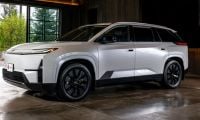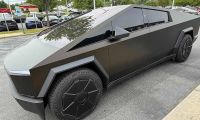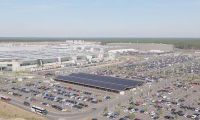One of the big questions in the adoption of electric vehicles is whether Tesla Motors will survive. What that means this month, as Tesla's management prepares to release quarterly results, is the sales and production of the Model S, and whether the company will be able to meet the target for 2013. Bloomberg News is reporting today that Tesla CEO Elon Musk said the company is producing significantly more than 400 Model S's a week, indicating they'll exceed their 2013 targets.
The company's initial target was 400 Model S's a week, or 20,000 a year. Production delays in 2012 caused the company to miss the targets last year which was a contributing factor to the massive loss recorded by Tesla in the last quarter of 2012.
However, as early as March 2013 the company said it was producing 500 Model S's a week, which would pencil out to about 25,000 cars a year roughly speaking. Indeed, for Q1 2013, the company recorded its first ever profit, after delivering more cars than its target for Q1, and raised the target for 2013 from 20,000 Model S's sold to 21,000.
Bloomberg quoted Musk saying, on July 10, “We’re above 400 a week at the current manpower, and not trivially above it.” We won't know precisely what that means until the company releases data for Q2 2013, which ended on June 30. It's a broad hint, however, that Tesla could conceivably beat the 21,000 target for 2013. Additionally, Musk said that in late 2014 they'll expand production at their factory to over 800 cars a week, when the Tesla Model X goes to production and on sale.
Tesla’s factory has 3,000 employees, including about 2,000 assembly workers, with two daily production shifts. The 5 million square foot factory in Fremont, CA, is the sole automobile factory remaining in California. It was formerly a joint operation between GM and Toyota, and when those companies had it running full bore it produced nearly 500,000 vehicles a year. That means Tesla has plenty of room to grow production capacity as it adds more vehicles to it's lineup in the coming years.
Source: Bloomberg News
Set as google preferred source










